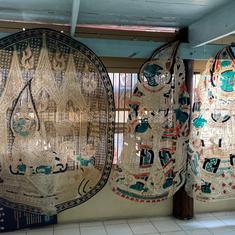A couple of fragmented tangerine clouds glided against the enormous screen of the sky. The diffused glow of the late afternoon light silhouetting the clouds streamed into our train, filling it with a melancholic, locomotive fervour. The cerulean outlines of the mountains, illuminated beneath the clouds by the descending light, appeared like uneven and distant conical edifices.
With the rhythmic rattling of the wheels’ quick friction in between the two rims of the rail-line, the minds of all the passengers became one with the stillness of the hills and the intangibility of the clouds – as if under the spell of inexplicable angst. It would probably be a few more hours before I reach Tura. Two long-distance trains ran towards the mountains, on two parallel lines. Railway management of such fashion is unheard of. But today was a day of wonders; one of the trains was apologetically late. There were no trains scheduled from the opposite side that day. The trains raced against each other, competing with the hiss of their pistons and the screeching of their whistles.
The administrators, though, wanted the late train to take the lead. The second train played along, as if it understood the stakes of the matter. It rapidly hurtled into every station the other was about to leave. I was a passenger on the second train, occupying a window seat. However, my eyes did not, could not, register the mesmerising landscapes outside. I watch my co-passengers: this grimy, crammed, and overflowing carriage full of people escaping the undue thronging of the Capital.
This game between the two roaring beasts of steel, glass, and wood had gotten all of us completely enthralled. I caught a glimpse of our competitor now and then. By the magic of relative velocity, the first train became a frozen frame before me. That is when I saw her, in its last carriage. Leaning on her elbow against the edge of the open window, she rested her face on her palm. How old was she? Twenty-five? Thirty? She did not notice our train, did not notice me. Before I could have etched her face in my mind, the first train picked up its pace. I strained to remember those eyes that had fleetingly met the field of my view.
I would not declare this as a memory. I did not know why the afterglow from the shadows and lights of the abandoned evening made me so very morose when I had only seen her in a rather pre-occupied manner.
When I saw her again at the next station, I became aware of the way her hand held her cheek. And again, her face disappeared with the acceleration of the train. I bought a sugary, milky cup of tea from the vendor and waited. Soon, the rapidly shifting frames of the windows became one moving silhouette. The lights in the carriage were turned on, the night wind brought the late fall chill from the mountains, and I pushed the window-pane down. Now every passenger alive in every little frame could see themselves in the opposite carriage; in every window of both trains, the two realities faded and merged into one another. Amidst these colliding worlds and hushed conversations, my gaze had startled her. The third time, our eyes met, and the fourth time I realised, even though she did not meet my eyes directly, she had waited for my train to catch up to hers.
Our windows met each other in the dimness of the dusk, and for a moment, so did her eyes and mine. Before she disappeared again, my reflection appeared on her window beside her figure, weaving into each other, though only for a second. I saw the woman at almost every stop. I imagined I saw her smile once, or maybe it was just her bright eyes that smiled, or maybe she had taken her hand off her cheek, so that I would see her full face. Her eyes were like tamed stars, beaming with intelligence. I knew it somehow. An episode from some lost memory was trying to reveal itself but could not.
The two trains crossed the bridge over the Simsung River unseparated. The angular iron trusses rushed backward, and all the air driven forward by the train created a mesmerising symphony of iron and rust. The Simsung River rested underneath: black in the gloom of the night, its pebble-beaten stream flowing towards the Capital in the south, from the hills in the north. Afar, on both banks of the river, sleepy lights hinted at villages. Our trains kept up with each other and, as we crossed the trusses, I looked for the girl in vain. After we crossed Simsung, the late train swept by us, never to meet again.

Excerpted with permission from The Chronicles of the Last Timesmith, Dipen Bhattacharya, translated from the Bengali by Chirayata Chakrabarty, Antonym.










